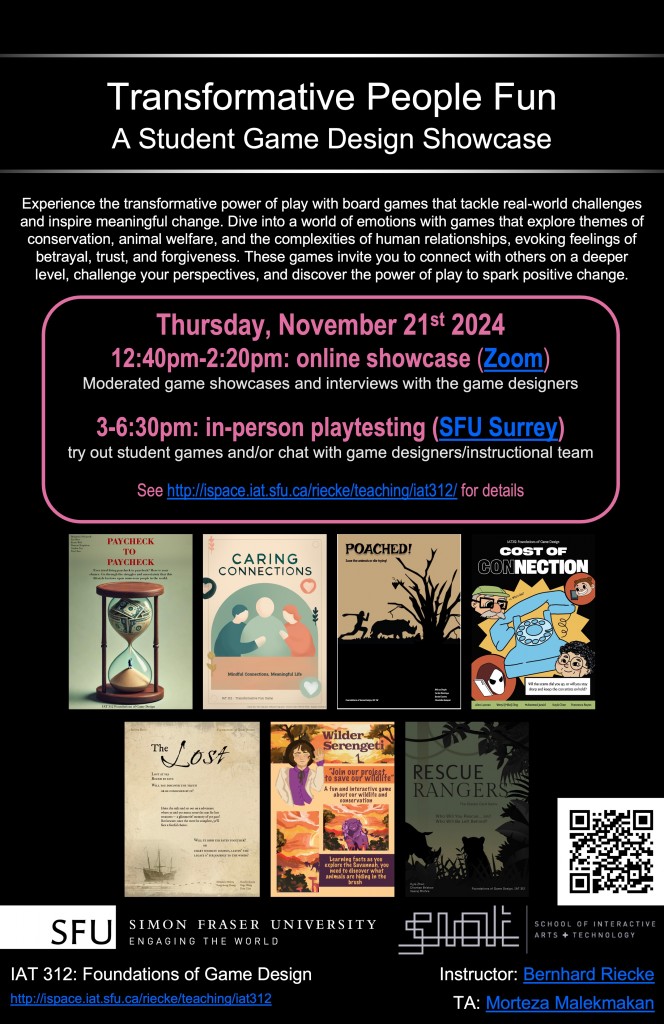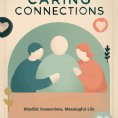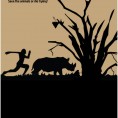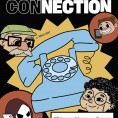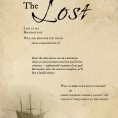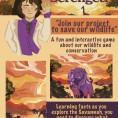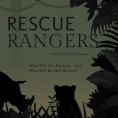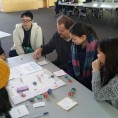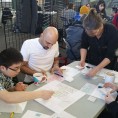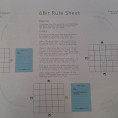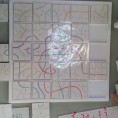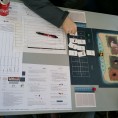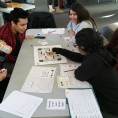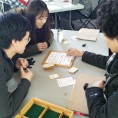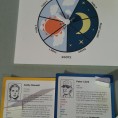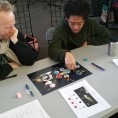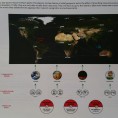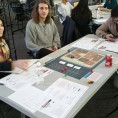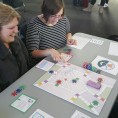Current offering: Fall 2024, taught by Bernhard Riecke & TA Morteza Malekmakan
Join us for our Game Design Showcase on Thursday 21 November 2024 (details TBD)
On Thursday 21 November 2024, students from my Foundations of Game Design course (IAT 312) will showcase their final game design projects where they were tasked to design a (digital) boardgame that is not only fun to play (addresssing what Lazzaro calls “People Fun”), but also “transformative” or “purposeful” (aka “Transformative Fun”, what Lazzaro refers to as fostering altered states): That is, apart from being fun to play, the game should also be meaningful/purposeful or add value by somehow changing the player’s out-of-game behaviours or perspectives. During the course, students reflected on topics that they care deeply about that could help create a better world, and designed a game to tackle that topic.
How to participate?
To participate in our showcase, you have 2 options:
Join us on Zoom for a live-streamed (online) showcase, from 12:40pm - 2:20pm, using this Zoom link
Schedule: [draft]
12:40 — 12:45pm: Introductions from Instructor (Bernhard Riecke) and TA (Morteza Malekmakan), overview of the course and the projects in the showcase.
12:45 — 2:20pm: Game Showcase & team interview: Each team will be showcased for about 10min, starting with the short project video pitch/trailer of their game (using zoom screen sharing), followed by Bernhard interviewing team members and TA screensharing their game in Tabletop Simulator, while other class students will play the game in the background so we can see life gameplay footage.
2:20pm: Closing: Final Q&A, audience questions, closing
Join us for in-person game demo/playtesting at SFU’s Surrey Campus in the Mezzanine, from 3 - 6:30pm
If you’d like to try out any of the games and/or chat with the game designers or instructional team, join us from 2:30-6pm on the SFU Surrey campus, in the Mezzanine (up the escalator/stairs one flight), see directions.
Documentation of prior course offerings and showcases from
Project posters
Details about the Games
Paycheck to Paycheck
Ever tried living paycheck to paycheck? Here is your chance to go through a simulation of the struggles and uncertainty that this lifestyle bestows upon numerous people in the world.
Razor: A game that allows players to experience the struggles of living paycheck to paycheck, where you have to balance your finances, mental health, and physical health in the stressful living situation, where resources are constantly drained and where you spend your time needs to be balanced properly.
Paycheck to Paycheck is a tabletop board game in which players aim to survive as long as possible barely making a living wage. Each player will have to manage their time between making money at their job and managing their physical and mental health by going to locations around the board. As they go through their day to day and pay their rent, they may meet up with others and compete against them going to certain locations, they can also buy perks or cards from the market and trade with others. There are also major events that will take place at certain times throughout the game.
1 minute game trailer:
Final project video:
Caring connections
Mindful Connections, Meaningful Lives
Razor: An uplifting therapy where players connect deeply, sharing their journeys and strengthening each other through empathy, encouragement, and shared resilience.
 Caring Connections is a collaborative board game where players role-play as individuals in group therapy sessions, fostering meaningful interactions to support one another in overcoming mental health challenges. Each player has a unique occupation and mental health issues, utilizing support cards and resources to assist each other in solving tasks. If any player’s mental health deteriorates significantly past a certain threshold, they “die” from suicide, causing a significant setback to the remaining players’ mental health as well. This dynamic emphasizes the importance of resource management and the well-being of others, promoting the significance of support within the team.
Caring Connections is a collaborative board game where players role-play as individuals in group therapy sessions, fostering meaningful interactions to support one another in overcoming mental health challenges. Each player has a unique occupation and mental health issues, utilizing support cards and resources to assist each other in solving tasks. If any player’s mental health deteriorates significantly past a certain threshold, they “die” from suicide, causing a significant setback to the remaining players’ mental health as well. This dynamic emphasizes the importance of resource management and the well-being of others, promoting the significance of support within the team.
1 minute game trailer:
Final project video:
Poached!
Save the animals or die trying!
Razor: A board game where you are animals trying to escape a malevolent poacher by gathering enough resources to make it to a reserve. Will you lead your animals to safety? Or will you be Poached?
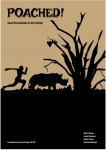 In Poached!, you play the role of a family of endangered animals trying to survive in the wild. Players must navigate through a maze-like board, scavenging for enough food to escape the area with, all while a hunter approaches each player. Risks must be taken by going to or scouting out various points of interest on the field, where either food or a hunter’s trap may appear.
In Poached!, you play the role of a family of endangered animals trying to survive in the wild. Players must navigate through a maze-like board, scavenging for enough food to escape the area with, all while a hunter approaches each player. Risks must be taken by going to or scouting out various points of interest on the field, where either food or a hunter’s trap may appear.
1 minute game trailer:
Final project video:
Cost of Con-nection
Ring! Ring! Ring! Who’s this? Will the scams dial you up or will you stay sharp and keep the con artists on hold?
Razor: A strategic and immersive party card game where players converse as elderly individuals, family members, and scammers, navigating trust, deception, and hidden motives to reveal the true family connections and prevent scams. Roleplay, buy information, and boost yourself to success.
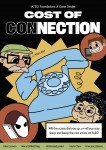 Cost of Con-nection is an engaging and lighthearted social deduction game where players navigate trust and deception through quirky conversations. Each player must use conversation and strategy to either deduce or deceive while taking on roles as elderly individuals, family members, or scammers. Elderly players strive to identify who they think truly cares for them and avoid falling victim to scams, while family members aim to prove their credibility to gain favours and scammers work to mislead. With hidden motives and immersive role-play, the game offers an intense and comedic exploration of trust and vulnerability, revealing deeper insights into human connections and the challenges faced by the elderly in the modern world.
Cost of Con-nection is an engaging and lighthearted social deduction game where players navigate trust and deception through quirky conversations. Each player must use conversation and strategy to either deduce or deceive while taking on roles as elderly individuals, family members, or scammers. Elderly players strive to identify who they think truly cares for them and avoid falling victim to scams, while family members aim to prove their credibility to gain favours and scammers work to mislead. With hidden motives and immersive role-play, the game offers an intense and comedic exploration of trust and vulnerability, revealing deeper insights into human connections and the challenges faced by the elderly in the modern world.
1 minute game trailer:
Final project video:
The Lost
Lost at sea, bound by fate—will you discover the truth or be consumed by it
Razor: The Lost is a pirate-themed 4-player cooperative survival adventure game where teamwork and resourcefulness are necessary for unlocking hidden memories and escaping the cursed seas. If you can survive your crewmates that long...
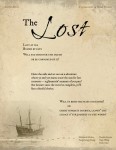 In “The Lost”, players awaken on a mysterious island with no memory of their past, armed only with a map marking the locations of keys and treasure. As they sail through treacherous waters, they must work together, balancing limited resources and precarious crewmate morale to overcome challenges that reveal pieces of their lost identities. With each discovery, the players unravel dark secrets of betrayal and greed, facing the choice to seek redemption or repeat past mistakes. This cooperative adventure tests courage, trust, and the strength of bonds, delivering an immersive experience of survival, mystery, and the power of forgiveness.
In “The Lost”, players awaken on a mysterious island with no memory of their past, armed only with a map marking the locations of keys and treasure. As they sail through treacherous waters, they must work together, balancing limited resources and precarious crewmate morale to overcome challenges that reveal pieces of their lost identities. With each discovery, the players unravel dark secrets of betrayal and greed, facing the choice to seek redemption or repeat past mistakes. This cooperative adventure tests courage, trust, and the strength of bonds, delivering an immersive experience of survival, mystery, and the power of forgiveness.
1 minute game trailer:
Final project video:
Wilder
Observe to Conserve
Razor: Wilder is a game about observing animal behaviors and conserving species and their habitat.
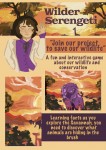 “Wilder” is a laid back deduction game where players will assume the role of conservationist working to research and understand animal behaviors. Each player will simulate animals and their behaviors on the board while the rest try to describe the animals based on their behaviors. Use your conservation funding to prevent events from reshaping the environment and harming the animals you are trying to conserve.
“Wilder” is a laid back deduction game where players will assume the role of conservationist working to research and understand animal behaviors. Each player will simulate animals and their behaviors on the board while the rest try to describe the animals based on their behaviors. Use your conservation funding to prevent events from reshaping the environment and harming the animals you are trying to conserve.
1 minute game trailer:
Final project video:
Rescue Rangers
Who Will You Rescue... and Who Will Be Left Behind?
Razor: A cooperative, fast-paced card game where every choice matters, challenging players to rescue animals and reduce cruelty levels before it's too late promoting teamwork, empathy, and awareness of real-world animal welfare issues.
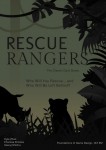 Rescue Rangers is a fast-paced, cooperative card game where players work together to save endangered animals from cruelty and habitat destruction. Set in a world on the brink, each player faces the urgent task of rescuing animals while managing limited resources to keep the escalating cruelty level at bay. With each turn, players make critical choices balancing immediate rescue efforts against long-term impact as they strive to protect as many animals as possible before time runs out. The game’s transformative theme promotes empathy for wildlife, offering players an engaging experience that blends strategy with a meaningful cause. By the end of the game, players walk away with a sense of urgency and a renewed awareness of real-world animal welfare challenges.
Rescue Rangers is a fast-paced, cooperative card game where players work together to save endangered animals from cruelty and habitat destruction. Set in a world on the brink, each player faces the urgent task of rescuing animals while managing limited resources to keep the escalating cruelty level at bay. With each turn, players make critical choices balancing immediate rescue efforts against long-term impact as they strive to protect as many animals as possible before time runs out. The game’s transformative theme promotes empathy for wildlife, offering players an engaging experience that blends strategy with a meaningful cause. By the end of the game, players walk away with a sense of urgency and a renewed awareness of real-world animal welfare challenges.
1 minute game trailer:
Final project video:
Prior students games from the Fall 2024 semester: within just 3 weeks, students designed the below People Fun games earlier this semester:
Inheritance Gambling
Grandpa’s dead! Fight for his money!
Razor: Out maneuver your family through investing in others or stealing from them and racing across the board on a desperate attempt to claim grandpa’s fortune.
Inheritance Gambling is a tabletop board game where players aim to earn the most gold by the end of the game. This is mainly done through investment events where one player has the opportunity to lie or tell the truth to other players to try to gain more gold than others; this can be done by stealing or collaborating. Players need to apply strategy and thinking on which cards have been played and the psychology of the others, creating a dynamic relationship allowing for depth and opportunity to deepen bonds.
team 1–1 short game pitch video:
Alien Blueprint
Build or Be Left Behind!
Razor: To survive the alien's experiment, humans must ask the right questions and distinguish truth from deception, while the alien tries to sabotage them by lying and placing preset bombs within the components to complicate the experiment; if both teams fail to find the answer within the rounds, the alien wins.
Experience the clash of creativity and cunning as an interstellar builder. Your mission is to decode an alien’s mysterious blueprint by strategically questioning the extraterrestrial being about its spaceship design. With only “Yes” or “No” answers at your disposal, each turn becomes a high-stakes puzzle with the looming threat of whether the alien is truthful. To return home, you must race against the opponent’s team to craft a spaceship that matches the blueprint before time runs out. Will you outwit the alien and escape its grasp, or will the secrets of the spaceship remain forever beyond your reach?
team 1–2 short game pitch video:
Wedding Crashers
Any objections? Speak now or forever hold your peace.
Razor: A card game where you are the best man at a wedding and you forgot to write a speech. Can you come up with the best one, or will you crumble under pressure?
Wedding Crashers is a card-based party game where players must improvise and think on their feet to deliver the best wedding speech they can. Players draw cards with strange and crazy topics and traits that must be included in their speeches, while utilizing objection cards strategically to sabotage other player’s speeches. Whichever player is voted to have the best speech, wins!
team 1–3 short game pitch video:
The Heir
Establish dominance through infamy, bribes, and blackmail. Will your child be ready to inherit your family legacy?
Razor: Draw cards, bid, and debate head to head with other players to increase your child’s skills in the war of succession to raise the best heir. A competition of quick wits, strategic resource management, and adaptability.
In “The Heir”, players embody mafia mothers raising their children to inherit their family’s criminal empire. Through strategic resource management, players balance Wealth, Fame, Intelligence, and Corruption as they face unpredictable events and competitive bidding wars. Each round builds tension, where players have a chance to prove their child is the superior heir and gain points. The game’s dynamic interactions, strategic decision-making, and social competition make each playthrough unique and engaging.
team 1–4 short game pitch video:
Purr-suasion
Cat got your tongue? The most purr-suasive cat wins!
Razor: Purr-suasion is a game where cats outsmart, outplay, and out-meow each other as they resolve household issues using the craziest tools for the job. Convince others of your ridiculous solutions and gather the support of your peers while you wait for Grandma to come home and dub you The Cutest Cat for all your efforts.
Purr-suasion is a party game; the ultimate cat-on-cat showdown where every roll of the dice brings new rooms, new problems and a new chance for chaos. Players are cats that are trying to solve the household problems they come across when they enter conflict with the other fluffy family members in the various rooms of the house. The catch? Players must use the item given to them by their opponent as part of their proposed solution, no matter how unrelated the item may be to the issue at hand. Earn Cutie Points for each vote you get from your cat peers and aim to be the Cutest Cat by the time Grandma gets back home!
team 2–1 short game pitch video:
Pressure Cooker
Cook or be cooked
Razor: Pressure Cooker is a Unilateral Competition game where a team of mice work together to navigate challenges set out by the cat player, completing recipes, overcoming obstacles and collecting resources all in order to foil the cat's plans.
Race against the clock, collecting resources and cooking recipes in this high pressure co-op experience where you have to face off against a ravenous cat. You and your team face off against the cat, played by one of your friends and armed with a deck of recipes and traps. Their aim is to overwhelm you with their challenges, but you and your ragtag group have ingredients and friendship on your side. Work together to avoid the pressure of the kitchen and the dangerous cat amidst the chaos, communicate, and complete these meals on time — unless you want to become one.
team 2–2 short game pitch video:
Whisker Wars
Will you rise to power or fall in battle?
Razor: An engaging cat battle simulator party game between kingdoms that prioritizes player strategy through action cards and skill-based minigames.
In Whisker Wars, players will engage in battles for supremacy, combining strategy and skill as they utilize action cards and conquer minigames to best their opponents. Each decision counts as players build alliances, break them, and become the strongest kingdom in the arena. Will you rise as the ultimate leader, or be destroyed by ones that challenge you?
team 2–3 short game pitch video:
Want to try out Games from prior classes?
type “IAT312” into the search field on the Tabletop Simulator site on Steam or through this direct link.
Course outline
Brief course intro video (spring 2021)
Course description
In a nutshell: you’ll learn how to design, build, analyze, and iteratively refine a number of (non-digital) board games.
Course goals
This is an introductory course in game design and we will examine the discipline and practices of game design. Games are studied across three analytical frameworks: games as rules (formal system), games as play (experiential system), and games as culture (social system). This course will include analytical and practical exercises in game design including small non-digital game design projects. Game design is a creative endeavour requiring practical experience through design, critique and iteration. We will explore some of the more universal game mechanisms, such as randomness, economic systems, player motivation and psychology, and a few specific topics in more detail. This course will prepare students to undertake the fundamentals of game design including designing, building, analyzing, and iteratively refining a number of non-digital games.
During the 2021 Spring semester, this course will be taught online and will apply a flipped approach to learning. Each week students will work independently and with peers learning about game design through videos, readings, discussions and small individual and team activities. In the live lecture part of this class, we will read and discuss some of the work that analyzes players, games and the game design process to establish common ground and prepare you for practical work in the labs where students will play(test), critique, improve and design games as well as report on the course’s longer game design projects.
No programming or Unity knowledge is required. All games created in this course will be or mimick analog games.
Intended learning outcomes
The course is intended to support you to gain both practical experience with and a critical understanding of the foundations of game design in specific contexts. Specifically, by fulfilling the requirements of the course you will be prepared to accomplish key tasks in 4 main game design areas:
- Game Design Basics:
- Explain and critically reflect on games, and the characteristics and features of different types of games including their components, mechanics & rules, dynamics, and aesthetics/UX/fun, the “Magic Circle”, and what makes for a compelling game
- Analyze and argue what makes for a compelling game (or not) and why people like to play games
- Game Design Frameworks & Psychology
- Compare and contrast different frameworks and underlying assumptions, and determine how and when to use which frameworks
- Explain different player types and psychologies, how they affect their gameplay, assumptions, and preferences, and use this knowledge to improve game designs
- Game Design Process:
- Explain and effectively utilize game design best practices/processes/frameworks/mechanics, and explain how you did this when designing several games in teams. This includes typical game design phases such as ideation, prototyping and play testing as the base for an iterative game design cycle
- Analyze, discuss, and critique games using appropriate terminology, and provide well-structured, constructive, and useful feedback (e.g., after playtesting or game pitches).
- Discuss the difference between game critiques vs. playtesting, and demonstrate why, when, and how to use either of them effectively to improve your game and design process
- Effectively demonstrate and reflect on how to effectively communicate your game across different stages (from early prototype to final game), to different audiences (both internal and external), and using different presentation formats (incl. written instructions/rule sheets, pitches, game design documents (GDDs), and game videos)
- Game Design Teams:
- Reflect on and apply suitable processes and team-based, collaborative practices used in game design including ideation, prototyping, iterative revisions, and playtesting as the base for an iterative design cycle to a game design project.
- Specific processes covered in this class may include structured team brainstorming (affinity diagramming), moodboards, inspiration analysis, Razor & Slogan, Play Matrix, playtesting scripts, structured game critique/analysis, and Agile project management)
- Explain what makes a good game designer, and why and how they often work in teams
- Reflect on your own and others’ assumptions, lenses, beliefs, what people really care about, and preferences about games/playing, and how do they affect game design and teamwork
- Explain and utilize a toolbox of how to foster a collaborative, constructive, and supportive team culture and process, including patterns of thinking and behaviour that support effective teams, as well as specific tools, tips, processes and frameworks (incl. Agile) that might be useful
- Find ways to effectively address challenges that can occur in team-based environments while being respectful and constructive. (This could include collaboratively resolve challenges that commonly occur in team-based projects, such as balancing between leading/following, communication challenges, conflicts that arise, ensuring all team members contribute meaningfully, engaging all team members, ensuring all care for the project and each other, getting people on the same page, and figuring out a shared vision/purpose that all can care about).
- Reflect on and apply suitable processes and team-based, collaborative practices used in game design including ideation, prototyping, iterative revisions, and playtesting as the base for an iterative design cycle to a game design project.
Delivery Method
This course will include a weekly live lecture (110 minutes) and a workshop-tutorial (110 minutes) component. The course will be delivered in-person using a partially “flipped” classroom approach. Students are expected to participate in:
- synchronous activities during the scheduled course times. This includes a live, interactive lecture with demonstrations, discussions, and some individual and peer/group work, as well as a live workshop-tutorial where students will practice and apply the concepts of the lecture in designing several games
- asynchronous activities (e.g., independent preparation before the lecture, team work, peer work etc. to prepare each week and to pace yourself carefully in order to stay on top of the activities/assignments and to get the most from the class).
The learning environment will be active, supporting, and will afford opportunities for students to strengthen knowledge, skills, and feel a part of a community.
Teaching/Learning Activities
these include:
- Interactive lecturing and demonstrations
- Flipped-classroom activities: e.g., students are asked to watch online tutorials & do readings at home so they can come to class prepared to do a short quiz, discuss and apply the material, and fill out the weekly JiTT online assignments
- Tutorial sessions
- A team project made up of several team assignments/presentations that culminate in a final group project report/presentation and project video
- Group discussions (in-class and online chat– and discussing forums)
- Short in-class writing and other activities
- Weekly reading and short writing assignments
- Several short student team presentations
- Peer feedback and evaluations
Main textbook
- Fullerton, T. (2019 o3 2024). Game Design Workshop: A Playcentric Approach to Creating Innovative Games, Fourth Edition (4th/5th Edition.). Boca Raton, FL: A K Peters/CRC Press. ISBN: 9781315104300. This is our main textbook, so make sure you have access and get your own copy by the first week of the semester. You should be able to access it online through the SFU library.
- Schell, J. (2019). The Art of Game Design: A Book of Lenses, Third Edition. A K Peters/CRC Press. doi:10.1201/b22101. You should be able to access this online through the SFU library.
Additional readings will be provided through Canvas.
Software used for game design & playtesting: Tabletop Simulator
Based on prior student feedback and recommendations, and there being chance we might need to switch to online teaching: you won’t need to purchase physical prototyping materials for designing your own games. Instead we will use an online board game simulator, the “Tabletop Simulator” https://www.tabletopsimulator.com/about. Course assignments will be taught and demonstrated with this software, and other software will not be supported by the course. You can also use this software for rapid prototyping and designing your games in your teams, and it also works really well for online and distributed playtesting (and of course gaming just for fun), and sharing your final games online. Thus we strongly recommend that you purchase, download, and install your own copy of it before class starts, see link above of directly from Steam https://store.steampowered.com/app/286160/Tabletop_Simulator/. it runs on both Windows and MacOS and currently costs CDN$ 25.99. The software has a lot of excellent online resources and tutorials available at https://www.tabletopsimulator.com/about. Note that to minimize your extra costs for this class, we are removing the need to purchase physical prototyping and game design materials, and I chose a textbook where our library provides free online access.
To see and try out prior games from my IAT 312 course you can enter “IAT312” into the search field on the Tabletop Simulator site on Steam or through this direct link.
Weekly Structure
The course will apply a “flipped” approach to learning. This requires you to prepare each week and to pace yourself carefully in order to stay on top of the activities/assignments and to get the most from the class. Each week it will go something like this:
Preparing Before Lecture
You will begin the week by checking the weekly plan and your tasks on Canvas, and then watching short, online tutorials, lectures, or other videos related to this week’s topics; then you will be invited to do the weekly readings that will cover topics of the week. You will use a reading guide/JiTT questions to help you focus on key aspects of the readings, to answer key questions that will help you to understand the ideas in the readings, and start applying them in the JiTT (“Just in Time Teaching”) online short weekly assignments. We will also ask you about any “muddy points” or questions you might still have after going through the videos, readings, and JiTTs. This will be done before the live lecture and will help us decide what aspects to focus on specifically in the “lecture”. Occasionally you may be asked to do a short quiz to indicate how well you have understood the concepts in the readings and videos.
We will assist you in forming small study groups for those interested to help you digest and reflect on the materials before class, and have people to discuss the topics with (as that can sometimes be a challenge in online teaching). We will also have a course slack channel for online discussions and Q&A.
Engaging in the Live Lecture where we discuss and apply the material
The lectures will be interactive and include small group discussions, demonstrations, student presentations and feedback sessions, and instruction on key ideas. Parts of the lectures may be recorded for review. It is important to realize that the lectures will focus on key ideas and applications and will not be a re-teaching of content found in the readings and videos. You are required to read and prepare for the live lecture.
Participating in the Tutorials (aka Workshops or WKS)
Following the live lecture each week there is a tutorial aimed to provide opportunities for practicing and applying the knowledge and skills of game design. The tutorials will include small group learning, team activities, game playtesting, and peer feedback in particular on the game design projects. Teams may be called upon to do short presentations or pitches of their game ideas and receive feedback from peers and the instructor on their designs. The tutorials will be highly engaging and practical and require your full contribution. They also require active participation in the prior lecture.
Documentation of prior (and ongoing) games that students created
Spring 2023
Spring 2022,
Fall 2021
Summer 2021
Spring 2021
Examples and details from the Fall 2017 course offering
For their final game project, students were asked to design a non-digital game that includes “Transformative Fun” aspects, also known as “serious fun” (e.g., Lazzaro): That is, the game should be meaningful/purposeful or add value by somehow transforming the user, e.g., by providing a novel/meaningful user experience, different perspectives/viewpoints, altered states etc.
Pictures from the final showcase on Dec 13, 2017
Sample Project Videos
ōBit
One Week to Refuge
